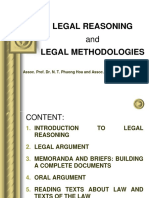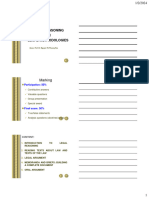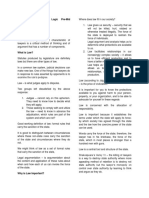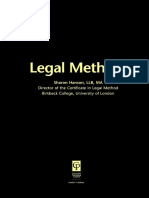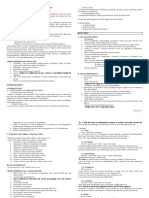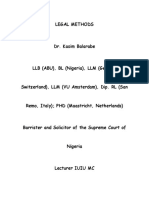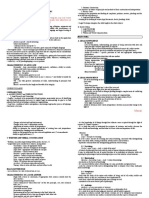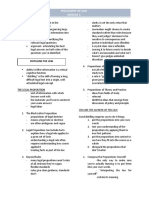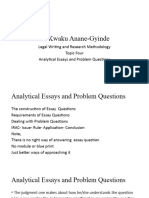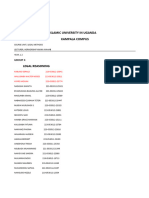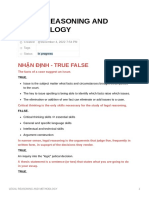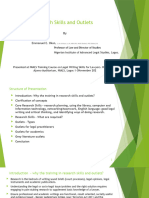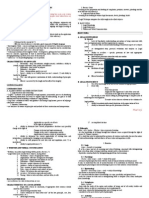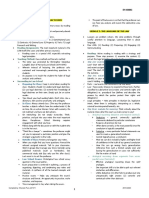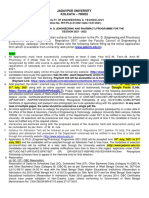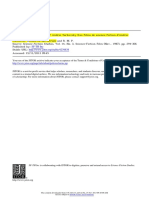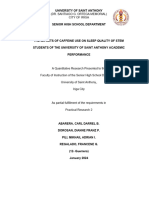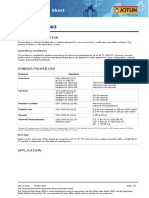8/11/2024
LEGAL REASONING
and
LEGAL METHODOLOGIES
Assoc. Prof. Dr. Nguyen Thi Phuong Hoa
Marking
⚫Participation: 50%
✓ Contributive answers
✓ Valuable questions
✓ Group presentation
✓ Special award
✓ Reading and writing
⚫Final exam: 50%
✓ True/false statements
✓ Analysis questions (doctrines/cases)
CONTENT:
1. INTRODUCTION TO LEGAL
REASONING
2. READING TEXTS ABOUT LAW AND
TEXTS OF THE LAW
3. LEGAL ARGUMENT
4. MEMORANDA AND BRIEFS: BUILDING
A COMPLETE DOCUMENT
5. ORAL ARGUMENT
1
� 8/11/2024
CHAPTER 1
INTRODUCTION TO LEGAL
REASONING
I. THE STUDY OF LEGAL
REASONING
II. THE ART OF LEGAL REASONING
1. CONCEPT
What is “legal
reasoning“?
2
� 8/11/2024
1. CONCEPT
Broad sense:
“The psychological
processes undergone by
judges in reaching
decisions in the cases
before them”.
Why “judges”?
Psychological processes
comprised of:
⚫Ideas
⚫Beliefs
⚫Conjectures
⚫Hunches
⚫Feelings
⚫Emotions
3
� 8/11/2024
Narrow sense:
“The arguments that
judge gives, frequently
in written form, in
support of the decisions
they render”.
Arguments consist of:
⚫Reasons for the decisions
⚫Justifications for the decisions
2. Purposes of legal reasoning
study
▪ The study of legal reasoning in
the broad sense = the study of
judicial psychology and
biography →
▪ to know judges and their psychology
▪ to understand what impacts judges’
decisions
4
� 8/11/2024
▪ The study of legal reasoning in the
narrow sense = an inquiry into the “logic”
of judicial decision making:
✓ kinds of arguments judges give
✓ the relationship between the reasons
and the decisions, the adequacy of
these reasons as support for the
decisions
✓ Applying this knowledge in one’s
career
3. Skills required for legal
reasoning study
❖ Skill: an ability to do an activity or
job well, especially because you
have practised it
Skills required for legal reasoning study
❖ Critical thinking skills
❖ General and specific language skills
❖ Intellectual and technical skills
❖ Argument construction
5
� 8/11/2024
3.1 Critical thinking skills
⚫ Essential skills
What is thinking?
Mental activity that helps formulate/
solve a problem, make decision/
fulfill a desire to understand.
Critical thinking is a high-grade
activity of thinking.
A set of skills and attitudes that are
deployed logically and selectively to
evaluate arguments
⚫ The ability to be:
– Curious (being interested
in learning)
– Flexible (being able to
adopt easily to different
situation)
– Sceptical (questioning that
something is true and
useful)
6
� 8/11/2024
Excercising judgements shall be based
upon careful:
⚫ Observation of the issues relevant
⚫ Investigation to the matter to which
a judgement is to be
⚫ Consideration made
Critical thinking skills
include:
⚫ Reasoning logically
⚫ The ability to locate underlying
assumptions (searching for hidden
assumptions; justifying your own
assumptions; judging the rationality of
those assumptions; testing the accuracy of
those assumptions).
⚫ Analystic and argument skills.
Tips for developing critical
thinking skills?
7
� 8/11/2024
3.2 General and specific
language skills
⚫Grammar, spelling, vocabulary,
punctuation
⚫Appreciation of the influence and
power of language.
Differences between
general and special
language?
3.3 Intellectual and
technical skills
⚫ How to locate primary and secondary
sources of materials
⚫ How to read texts of the law and the
texts about law
⚫ How to write (using references,
summaries, notes)
8
� 8/11/2024
Primary source
Direct evidences or original sources of information
created at the time the event occurred
Information which was recorded
first-hand soon after the event occurred.
accounts of
event
data collected
for scientific
studies
historical
documents
Primary Source
Nelson Mandela wrote his
autobiography about events
in his life called “Long Walk
to Freedom: The
Autobiography of Nelson
Mandela”. This is a primary
document because he wrote
his first hand experiences.
Secondary source
General In legal
meaning profession
▪ Derived from
primary source
▪ written about provide
primary sources summaries and
▪ analyze, interpret, interpretations of
and discuss the law and facts
information about
the primary source.
To evaluate if the source is primary or secondary →
Check the context and purpose of its use
9
� 8/11/2024
Why should we use primary
sources?
⚫To explain how major events are
related to each other in time.
⚫To think critically and distinguish
between facts and opinions.
⚫To develop your own conclusions
and analyze how historical events
affect relevant parties.
Why should we use secondary
sources?
⚫To get expert opinions in order to
evaluate what really happened.
⚫To gain insight by examining the
same event from different
perspectives.
⚫To form your own opinion.
⚫To save time by reading
information collected from a
number of different sources.
COMPARISON
Primary source Secondary source
▪ Created at the time of an ▪ Created after event;
event, or very soon after. sometimes a long time
after something
happened.
▪ Created by someone who
saw or heard an event ▪ Expresses an opinion or
themselves. an argument about a past
event.
▪ Often uses primary
sources as examples.
To evaluate if the source is primary or secondary →
Check the context and purpose of its use
10
� 8/11/2024
Strength Weakness
Primary ✓High accuracy ✓ Time consuming
sources ✓ Hard to find
Secondary ✓ Ease of access ✓ Quality of research
sources
✓ Low cost to acquire ✓ Not specific to your
needs
✓ Clarification of research
question ✓ Incomplete
information
✓ May answer your own
research question ✓ Not timely
Reading Sources
Ask these basic questions :
– Who wrote this?
– What does it say?
– When was it written?
– Where was it written?
– Why was it written?
Summing up
It is important to determine the type
of information you are looking at.
– Primary sources are original sources
of information
– Secondary sources summarize,
analyze, or critique primary sources
– Both primary and secondary sources
can be good sources of information,
but you need to critically evaluate
them.
11
� 8/11/2024
In legal research, legal reasoning
⚫ Primary sources = law generated by a
governmental body or cases.
⚫ Secondary sources: other resources
which may be written by lawyers or
judges or other legal professionals
which comment on the law, categorize
the law or otherwise interpret the
primary sources.
In Legal Reasoning
⚫ Primary sources can be
either mandatory (binding)
or persuasive.
⚫ Secondary sources are
always persuasive
authority.
⚫ The researcher is always
looking for primary
sources which are
mandatory.
Some Examples
Primary or
secondary source?
12
� 8/11/2024
3.4 Argument construction
⚫Construction
⚫Evaluation
⚫Interpretation
⚫Deconstruction
I. THE STUDY OF LEGAL
REASONING
II. THE ART OF LEGAL REASONING
1. The language as a professional tool
2. Styles in legal writing
3. Planning, rewriting, and work habits
1. The language as a professional tool
⚫The role of language in general
⚫The role of language in legal
profession
13
� 8/11/2024
▪ a means of communication
The thoughts are explained and known through the
language
The role of language in legal
profession
Language: professional tool in
legal profession
The role of language in legal
profession
If your reader’s/listener’s attention is
drawn to the obscurities and other
faults in your writing/presentation,
you and your client will suffer for
several reasons.
14
� 8/11/2024
First, the typical reader begins to
resist and may not finish reading
because lawyers and judges are
busy people who do not have time
wade through difficult writing.
Second, the reader is tempted to
consider you unreliable/
unprofessional because mediocre
use of the language implies general
mediocrity as a lawyer.
Third, the busy reader may
misunderstand what you are trying to
say. Legal writing should give the
viewer a quick and clear view, without
distractions, of the idea behind it.
15
� 8/11/2024
Characteristics of legal language
⚫ ordinary words with specialized
meaning (law suit)
⚫ Latin words and phrases (mens rea –
guilty mind, actus reus - conduct)
⚫ Norman French (per se)
Characteristics of legal language
⚫ Claims that words can be used with
precision
⚫ Ritualized word forms (ex: the truth,
the whole truth and nothing but the
truth)
⚫ Use of words with flexible meanings
(reasonable)
Question:
The role of language to lawyers?
→ Viewing it in various aspects
16
� 8/11/2024
2. Sytles of legal writing: predictive writing
and persuasive writing
3. Planning, rewriting, and work habits
⚫ Well organized
⚫ Complete
⚫ Clear
⚫ Concise
⚫ Forceful
⚫ Accurate and precise…
Question:
Which work habits are useful to
legal profession and how to
build them up?
Which work habits should be
avoided in legal profession and
how to cure them?
17
� 8/11/2024
Good work habits
⚫Comprehensive and critical views
⚫Well- structured
⚫Concentrating (not to be
distracting)
⚫Language: exact, concise
⚫Style: coherent, cohesive
⚫Argument: logic
⚫evidence, proof
18

